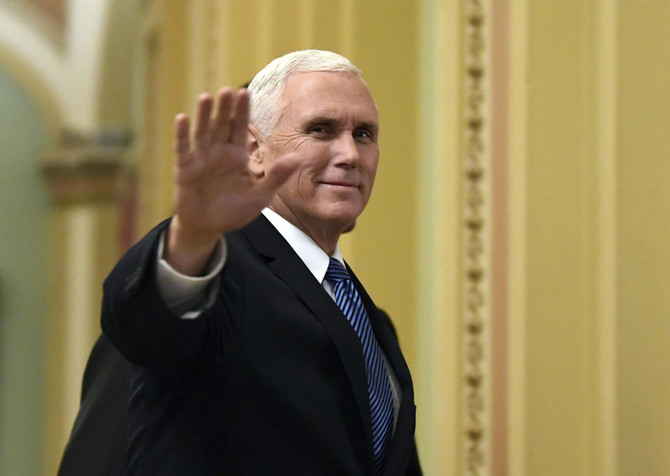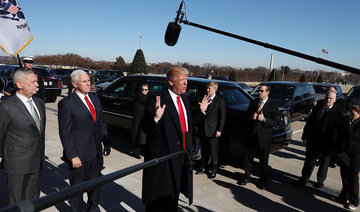WASHINGTON: Vice President Mike Pence is making his fifth visit to Israel, returning to a region he has visited “a million times” in his heart.
An evangelical Christian with strong ties to the Holy Land, Pence this time comes packing two key policy decisions in his bags that have long been top priorities for him: Designating Jerusalem as Israel’s capital and curtailing aid for Palestinians.
Since his days in Congress a decade ago, Pence has played a role in pushing both for the shift in US policy related to the capital and for placing limits on funding for Palestinian causes long criticized by Israel.
Traveling to Israel just as Palestinians have condemned recent decisions by President Donald Trump’s administration, Pence will arrive in the region as a longtime stalwart supporter of Israel who has questioned the notion of the US serving as an “honest broker” in the stalled peace process.
“The United States certainly wants to be honest but we don’t want to be a broker,” Pence once told the Christian Broadcasting Network in 2010. “A broker doesn’t take sides. A broker negotiates between parties of equals.”
The vice president will hold four days of meetings in Egypt, Jordan and Israel during his visit, the first to the region by a senior administration official since Trump announced plans in December to designate Jerusalem as Israel’s capital and begin the process of moving the US Embassy from Tel Aviv, angering Palestinian leaders.
Pence was departing as US lawmakers sought to avert a federal government shutdown at midnight Friday. Senior White House officials said Pence planned to leave Friday evening as scheduled.
His trip will also follow Tuesday’s announcement that the US is withholding $65 million of a planned $125 million funding installment to the UN Relief and Works Agency, which provides health care, education and social services to Palestinians in the West Bank, Gaza Strip, Jordan, Syria and Lebanon.
Both decisions have come as Trump has expressed frustration over a lack of progress in restarting peace negotiations between Israel and the Palestinians, who withdrew plans to meet with Pence during his visit to the Middle East.
Senior White House officials said security issues, countering terrorism and efforts to push back against Iran would figure prominently during Pence’s trip, which concludes on Tuesday. But the vice president also is expected to face questions about Israel’s future.
On the embassy, Pence played a steady role in pushing for the shift in US policy. The decision upended past US views that Jerusalem’s status should be decided in negotiations between Israel and the Palestinians, who claim east Jerusalem as the capital of their future state.
Pence had wanted the Trump administration to convey “a clear-cut policy” on Jerusalem after the president asked him last summer to visit the Middle East, White House officials have said.
Pence discussed the issue with Jewish and evangelical leaders in the months leading up to the decision and advocated for the plan within the administration. But he noted to religious leaders late last year that the decision was the president’s alone and would fulfill a commitment from the 2016 campaign.
Pence has long aligned himself with Israel.
In Congress, he pushed for limiting US aid to the Palestinian Authority during the presidency of George W. Bush, warning the funding could be redirected to groups like the militant Hamas movement, which controls Gaza.
He was a vocal advocate for Israel’s security fence and co-sponsored the Jerusalem Embassy and Recognition Act in 2011 to recognize Jerusalem as Israel’s undivided capital. Veteran House members recall Pence’s role as a staunch ally of Israeli causes and his steadfast support for moving the embassy to Jerusalem at times when few were talking about the issue.
As Indiana’s governor, Pence signed a bill requiring the state to divest from any business that engaged in the Boycott, Divestment and Sanctions Movement — a grassroots international boycott movement against Israel.
Kenneth Weinstein, CEO of the Hudson Institute, a conservative think tank, said it has been “central to his political life from the absolute outset, from when he first ran for Congress — it’s something that’s central to who he is, to what he believes in.”
Pence traveled to Israel for the first time as an Indiana congressman in January 2004, joining a delegation from the Jewish Federation of Greater Indianapolis. He placed a wreath at the Yad Vashem Holocaust Memorial and visited the Western Wall, both of which are on Pence’s itinerary again next week, and had a private meeting with then-Israeli Prime Minister Ariel Sharon.
Doug Rose, a philanthropist in Indianapolis, flew with Pence on his 2004 trip to Israel and recalled him being deeply affected by the experience. “How could you not be moved?” Rose said of their site visits.
Pence told the Indiana Jewish Post and Opinion after his 2004 trip that he was often asked if he had been to Israel before, “and my response was, ‘Only in my dreams.’ I was raised an evangelical Christian and tried to read the Bible every day, so in my mind and in my heart I have been there a million times.”
Trump’s decision on Jerusalem has drawn protests from Middle Eastern leaders and prompted Palestinian President Mahmoud Abbas to pull out of a planned meeting with Pence in the biblical West Bank town of Bethlehem. Administration officials said Pence is not expected to meet with Palestinian leaders during the trip.
Pence remains popular with evangelical voters in the US, a large and influential constituency that helped propel Trump to victory in last year’s election. American evangelicals, especially the older generation, have a strong affinity for Israel, drawn both on spiritual grounds and a genuine love for the modern-day country and the Jewish people.
Rabbi Yechiel Eckstein, the US-born founder and president of the International Fellowship of Christians and Jews, a charity that raises tens of millions of dollars for Israeli causes from American evangelicals, said Pence’s upcoming visit should go over well with evangelicals and help shore up their support for the Trump administration.
“He’s an extension of evangelicalism and evangelical feelings for Israel, and its history,” Eckstein said. “Trump doesn’t have that history. Pence has that history of being pro-Israel.”



























